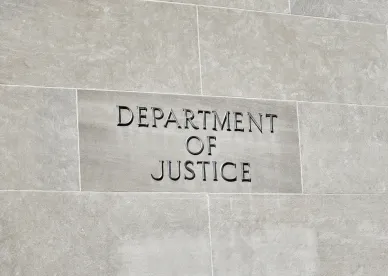The U.S. Department of Justice (DOJ) formally implemented a nationwide Voluntary Self-Disclosure policy (VSD policy) on February 22, 2023—effective immediately—that has been in the works for several years. The VSD policy incentivizes corporations to report misconduct to U.S. Attorneys’ Offices (USAOs) “before that misconduct is publicly reported or otherwise known” in exchange for reduced criminal penalties up to and including a presumption of declining criminal charges.
As previously noted in Beveridge & Diamond alerts in September 2022 and January 2023, these corporate criminal enforcement policy revisions stem from proposals developed by a tripartite group within DOJ: the Corporate Crime Advisory Group under the leadership of Deputy Attorney General (DAG) Lisa Monaco; the Attorney General’s Advisory Council (AGAC), chaired by the U.S. Attorney for the Southern District of New York, Damian Williams; and the White Collar Fraud Subcommittee of the AGAC, chaired by the U.S. Attorney for the Eastern District of New York, Breon Peace.
U.S. Attorneys Williams and Peace issued a press release announcing the policy and its implications for improved corporate self-governance and increased cooperation between corporations and prosecutors.
Key Takeaway: Cooperation with Prosecutors Could Yield Major Benefits
The VSD policy includes stringent standards for self-reporting—described in detail below—and seeks to “ensure individual accountability for misconduct.” In exchange, the policy offers complying corporations major criminal, financial, and reputational advantages.
Where a corporation fully complies with the VSD policy—a determination made by the USAO—, the USAO overseeing the matter commits to consider: declining criminal charges or foregoing seeking a guilty plea, imposing criminal penalties not greater than 50 percent of the low-end of the U.S. Sentencing Guidelines range (and may decline fines altogether), and not seeking to impose an independent monitoring program if the corporation has an effective internal compliance program.
Corporations must come forward to prosecutors, cooperate, remediate, and demonstrate ongoing compliance. The VSD policy directs USAOs to consider these actions and afford a complying corporation meaningfully reduced penalties.
VSD Policy Lays Out Stringent Compliance Standards
The VSD policy provides that federal prosecutors “should consider whether the criminal conduct at issue came to light as a result of the company’s timely, voluntary self-disclosure and credit such disclosure appropriately.” A USAO has sole discretion to undertake this assessment and any resulting “credit” on a case-by-case basis.
-
“Timely” means the corporation disclosed misconduct to the USAO “prior to an imminent threat of disclosure or government investigation[,] prior to the misconduct being publicly disclosed or otherwise known to the government[,] within a reasonably prompt time after the company becoming aware of the misconduct[.]”
-
“Voluntary” means there was not a “preexisting obligation to disclose, such as pursuant to regulation, contract, or a prior [DOJ] resolution[.]”
-
“Self-disclosure” expressly requires that “the disclosure must include all relevant facts concerning the misconduct that are known to the company at the time of the disclosure.” Since it is possible (if not likely) that all salient facts are not known by a corporation seeking to timely self-disclose under the VSD policy, USAOs will acknowledge that a corporation’s self-disclosure is based on a “preliminary investigation or assessment” and expect “timely factual updates,” including relevant document production to the USAO.
Furthermore, if a separate prosecutor, regulator, or agency initiates an investigation in the context of similar voluntarily self-disclosure policies, the VSD policy provides that the USAO will coordinate its criminal resolution with that third party.
Policy Benefits Require Ongoing Cooperation and Remediation—With or Without an Aggravating Factor
The job isn’t done once a timely, voluntary self-disclosure is made. Corporations seeking to benefit from the VSD policy must fully cooperate with USAOs’ and/or other agencies’ investigations and criminal resolutions. The corporation must also appropriately remediate the misconduct.
In VSD cases with no aggravating factor, the USAO will not seek a guilty plea and “in any event will not impose a criminal penalty greater than 50% below the low end of the U.S. Sentencing Guidelines fine range.”
Aggravating factors typically stem from misconduct that:
-
Poses a “grave threat to national security, public health, or the environment”;
-
Demonstrates pervasive misconduct throughout the corporation; or
-
Involves current executive management.
Guilty pleas may be sought where there is an aggravating factor; however, the VSD policy could benefit corporations even in these circumstances. The USAO will (a) accord or recommend 50–75% reductions in criminal penalties, and (b) will not require the appointment of an independent monitor if the corporation demonstrates an effective compliance program. Despite seeking a charge or admission of guilt, the USAOs’ recommendations before sentencing courts could lead to major cost savings.
Background
-
April 2016: DOJ’s Criminal Division created a pilot program targeting violations of the Foreign Corrupt Practices Act (FCPA) that provided potential benefits for self-reporting misconduct, cooperating with DOJ, and timely remediating any wrongdoing.
-
November 2017: DOJ expands the FCPA Pilot Program to become the FCPA Corporate Enforcement Policy (CEP) and incorporated the CEP into the DOJ’s Justice Manual.
-
October 2021: DAG Monaco announced the formation of the Corporate Crime Advisory Group and charged the Advisory Group to develop revisions to corporate criminal enforcement policies.
-
September 15, 2022: DAG Monaco issued a memorandum, “Further Revisions to Corporate Criminal Enforcement Policies Following Discussion with Corporate Crime Advisory Group,” that guides prosecutors to cooperate with and credit self-reporting corporations.
-
December 2022: DOJ consulted with several groups, including the Securities and Exchange Commission (SEC) and other federal agencies, executive compensation experts, and defense attorneys, to design revisions to the Corporate Enforcement Policy.
-
January 17, 2023: Assistant Attorney General Kenneth Polite Jr. previewed significant revisions to the Corporate Enforcement Policy during a speech at Georgetown University. “We are going to be closely examining how companies discipline bad actors and reward the good ones,” said AAG Polite.
Conclusion
The DOJ followed through on longstanding plans to institute a new corporate criminal enforcement regime that favors corporations seeking to comply with the law immediately after uncovering misconduct. Corporations with environmental legal issues should familiarize themselves with this policy, establish mechanisms for reporting potential and actual criminal misconduct as soon as possible, and assess whether their compliance programs are sufficient to pass muster with the USAO in their jurisdiction.






 />i
/>i

